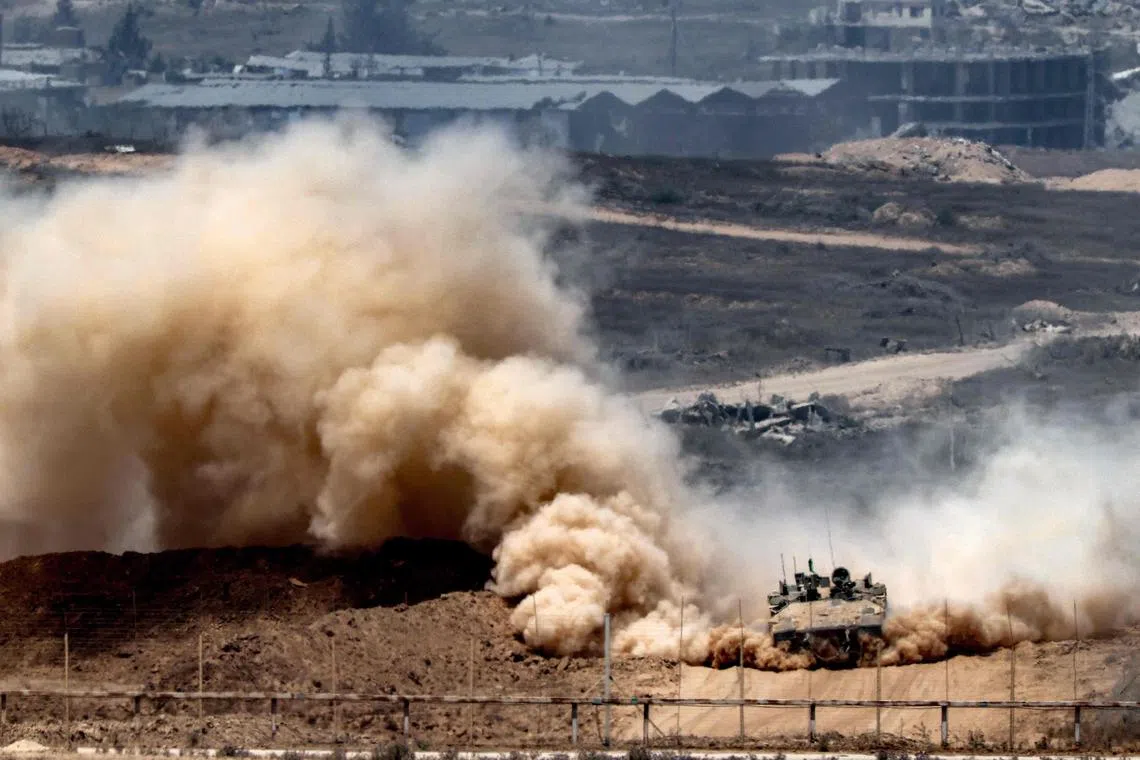Israeli army will ‘take control’ of Gaza City: PM’s office
Sign up now: Get ST's newsletters delivered to your inbox

The Israel Defence Forces already controls some 75 per cent of the Gaza.
PHOTO: AFP
JERUSALEM – Israel’s security Cabinet has approved a plan proposed by Prime Minister Benjamin Netanyahu for the military to “take control” of Gaza City, his office said on Aug 8.
Under the plan to “defeat” Hamas in the Gaza Strip, the army “will prepare to take control of Gaza City while distributing humanitarian assistance to the civilian population outside combat zones”, it added.
Hamas warned the Israeli government on Aug 8 that seizing control of Gaza City would amount to “sacrificing” the hostages still being held in the Palestinian territory.
“The decision to occupy Gaza confirms that the criminal Netanyahu and his Nazi government do not care about the fate of their captives,” the group said in a statement. “They understand that expanding the aggression means sacrificing them.”
Nearly two years into the war in Gaza, the Israeli Prime Minister faces mounting pressure at home and abroad for a truce to pull the Palestinian territory’s more than two million people back from the brink of famine
As he convened his security Cabinet on Aug 7, Mr Netanyahu said Israel planned to take full control of Gaza but did not intend to govern it.
Ahead of the meeting, he told US network Fox News that the government intended to seize complete control of the Gaza Strip, where the military has been fighting Hamas since the Palestinian group’s Oct 7, 2023 attack on Israel.
He added that Israel did not want “to keep” the Gaza Strip, which Israel occupied in 1967 but withdrew troops and settlers from in 2005.
Mr Netanyahu said Israel wanted a “security perimeter” and to hand the Palestinian territory to “Arab forces that will govern it properly without threatening us and giving Gazans a good life”.
“That’s not possible with Hamas,” he added.
His office on Aug 8 said a majority of the security Cabinet adopted “five principles for concluding the war: the disarming of Hamas, the return of all hostages – living and dead, the demilitarisation of the Gaza Strip, Israeli security control in the Gaza Strip, and the establishment of an alternative civil administration that is neither Hamas nor the Palestinian Authority”.
“A decisive majority of security Cabinet ministers believed that the alternative plan that had been submitted to the security Cabinet would neither achieve the defeat of Hamas nor the return of the hostages,” it added.
An expanded Israeli offensive in Gaza could see ground troops operating in densely populated areas where hostages are believed to be held, Israeli media reported.
The reported plans to expand the war have sparked growing concern in Israel about what it means for the remaining hostages.
As the Cabinet meeting kicked off, hundreds rallied near the prime minister’s office in Jerusalem, calling for a deal to free the hostages.
“The only way to bring the hostages home is to halt the war and end the suffering of the hostages and all those living through this terrible conflict,” said protester Sharon Kangasa-Cohen.
In Gaza, fears grew over what an expansion of Israeli operations would entail.
“Ground operations mean more destruction and death,” said Mr Ahmad Salem, 45.
“More destruction”
Hamas said “Netanyahu’s plans to escalate the aggression confirm beyond any doubt his desire to get rid of the captives and sacrifice them in pursuit of his personal interests and extremist ideological agenda”.
Out of 251 hostages captured during Hamas’ 2023 attack, 49 are still being held in Gaza, including 27 the military said are dead.
Ahead of the Aug 7 meeting, rumours have been rife in the Israeli press about disagreements between the Cabinet and Israel’s military chief Eyal Zamir, who is said to oppose plans to fully reoccupy Gaza.
Defence Minister Israel Katz weighed in on social media on Aug 6, saying the military must ultimately respect any policies adopted by the government.
In a statement released by the military on Aug 7, Mr Zamir underscored his independence, vowing to “continue to express our position without fear”.
International concern has been growing over the suffering of Palestinians in Gaza, where a UN-backed assessment warned that famine was unfolding.
The World Health Organisation said at least 99 people have died from malnutrition in the Gaza Strip in 2025, with the figure likely an underestimate.
Displaced Gazan Mahmoud Wafi said the prices of available food remain high and erratic.
“We hope that food will be made available again in normal quantities and at reasonable prices, because we can no longer afford these extremely high and unrealistic costs,” the 38-year-old told AFP.
In late July, Israel partially eased restrictions on aid entering Gaza, but the UN said the amount allowed into the territory remains insufficient.
Mr Amjad Al-Shawa, head of the Palestinian non-governmental organisation Network in the Gaza Strip, told AFP that lengthy inspections at entry points meant few trucks could come in – “between 70 and 80 per day – carrying only specific types of goods”.
The UN estimates that Gaza needs at least 600 trucks of aid per day to meet its residents’ basic needs.
Israel’s offensive has killed at least 61,258 Palestinians, according to Hamas-run Gaza’s health ministry.
The 2023 attack on Israel resulted in the deaths of 1,219 people, according to an AFP tally based on official figures. AFP


